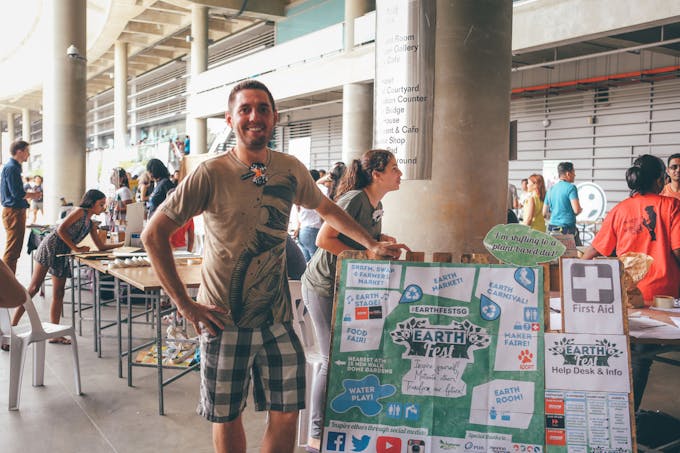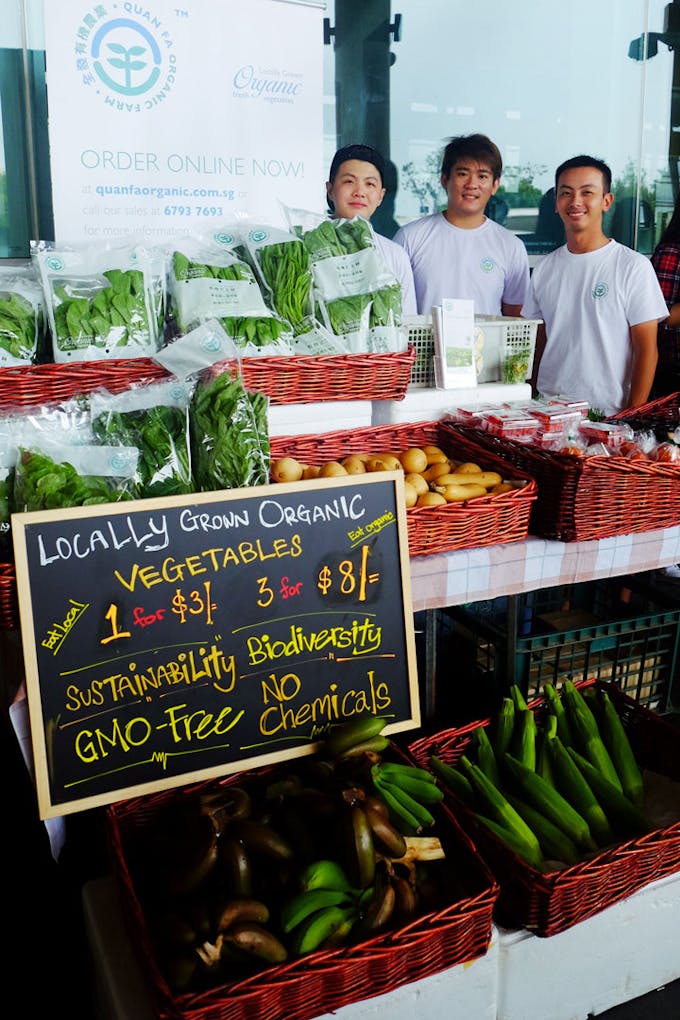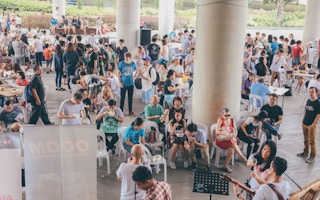Sustainable lifestyle festival, EarthFest, will return for the third year this month with hands-on workshops, shopping and talks to inspire Singaporeans to live and consume more consciously.
Visitors can expect a range of products to make sustainable living easier at the Earthmarket and Earthbazaar, tuck into plant-based cuisine at the Food Fair, or check out handmade goodies at the Maker Fair.
This year’s edition of the festival will boast a total of 120 stalls as compared to 2017’s 88, says Michael Broadhead, volunteer director of EarthFest. A chemistry teacher by day, Broadhead is active in local environmental circles and has had a hand in staging the Earth Film Fest and running Animal Allies, a community group for vegans.
EarthFest will be held on Sunday, 14 January. The rain-or-shine event is sold out.
There will also be talks, an exhibition, live music and fringe activities such as the popular Swapaholic clothing exchange and the Singapore Really Really Free Market, where people can donate or pick up second-hand items and for free.
Visitors who have registered for Bags for Cause Stitch-athon will gain hands-on experience in creating reusable cloth bags from donated fabric at this upcycling workshop.
Here’s what happened at EarthFest 2017. Video: Eco-Business
EarthFest is also hosting two collection drives: one for used cooking oil to be turned into biofuel, and for unused toiletries that will be distributed to the needy by the local freegan community. Freegans aim to reduce waste output by collecting and using unwanted food and products.
Carbon emissions generated during the festival—including visitor transportation—will be offset, says Broadhead. To minimise the festival’s carbon footprint, it allows only reusable bags, compostable material at the Food Fair, and digital distribution of flyers or other materials.
Ahead of the annual festival, Broadhead tells Eco-Business about his ultimate vision for EarthFest, the joys of minimalism, and what he views as the biggest challenge to addressing climate change.
What’s new at this year’s EarthFest?
This year we have over 120 stalls, so we’re much bigger! We are expanding to another level of Marina Barrage to accommodate all the stalls.
Which is your favourite or the most interesting stall or activity?
It’s hard to pick out one, but I really love the Food Fair because there’s so much to try out. Live music really helps create positive vibes.
EarthFest is a low-waste festival. Is it difficult to get vendors to accept EarthFest’s waste reduction measures?
We work with vendors to help them prevent and reduce the amount of non-recyclable and un-compostable waste produced. We do charge vendors more for creating waste, so there is an economic incentive there.
What we do is get them to do is record the anticipated waste their stall will generate and try to figure out how to prevent it. The stalls understand our motivations and are very receptive.
Where do you find the motivation and energy to continue working on your projects, such as the Earth Film Festival and EarthFest?
I really like the science of happiness, and one of the things we know is that helping others is one of the best ways to bring happiness. So although these projects are challenging, they are rewarding. I also find it hard to not take actions on issues, and it’s about doing my part.

Michael Broadhead, volunteer director, EarthFest
What gives you hope?
The critical nature of younger generations, who are questioning the systems that have been created and are innovative when it comes to changing the status quo.
Singapore has declared 2018 the Year of Climate Action. What do you hope to see here in the year ahead?
It’s my hope that people measure their carbon footprints so that they can take effective action [to reduce it]. For EarthFest, we developed an open source carbon footprint estimating tool. In terms of personal action, I also hope to see more efforts in addressing diet to reduce
You’ve lived in a number of different places in Asia, and are now based in Singapore. In your experience, how has environmental awareness in these societies evolved over the years?
The general trend I have seen is the increase in the number of grassroots efforts, especially through social media. Signing online petitions, messaging companies, or calling companies out on social media has really allowed consumers to influence how companies behave more quickly than ever before.
You’re also the director of the Earth Film Festival. What were the best films about sustainability you’ve seen in the last year?
An Inconvenient Sequel: Truth to Power.
What, in your opinion, is the biggest challenge we face when it comes to fighting climate change?
Diet change. Many governments resist taking action on this, even though the animal agriculture industry is the second largest contributor to climate change, after fossil fuels. While the world has largely started on the path to decarbonising its power and fuel supply, that doesn’t address a lot of the methane and nitrous oxide emissions in animal agriculture. Much of the developing world is starting to consume more meat, dairy and eggs.
If we aren’t able to reverse this trend and shift towards plant-based diets, this single industry will cause us to exceed our carbon budgets for averting catastrophic climate change. But there is some hope, as COP 23 was the first climate conference to discuss diet change as part of reaching climate goals.

Vendors at EarthFest 2017
It’s been said that being eco-friendly is a bit of a luxury. Sustainably produced items can command a premium in the stores, and organic foods aren’t cheap. What is your advice for people who don’t have deep pockets but want to help fight climate change?
My advice is to know your carbon footprint and embrace minimalism. By buying only what you need, you spend significantly less and that means you can spend on higher quality and more responsibly produced materials that last longer and are better for the planet.
Buying better food is an investment in your health that will pay off later, with fewer days off work or lower medical costs from chronic diseases.
What’s your ultimate vision for EarthFest?
My ultimate vision is that one day we won’t need an EarthFest because we have created a sustainable world. Until then, the goal is to continually rethink the festival to make it more impactful while reducing its footprint on the planet.
We are also hoping to find funding so that we can hire staff to continue the engagement between each edition of EarthFest and support people more effectively in their quests for sustainable living.

















